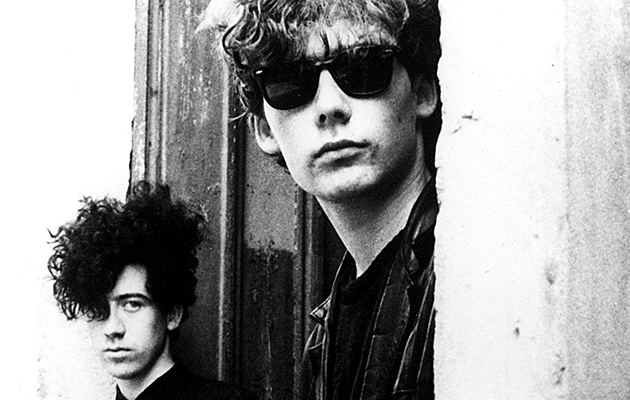https://www.youtube.com/watch?v=P55jua5OrD8
By the end of ’85, the Mary Chain should have been ecstatic. Psychocandy reached No 31 in the UK Top 40 and ended up second in the NME Albums Of The Year poll (behind Tom Waits’ Rain Dogs). The band had even managed to curtail the riots at their gigs by performing on time and extending their sets. However, beaten down by a relentless touring schedule, the group were dispirited; a situation exacerbated by the loss of Gillespie. “We were heartbroken when Bobby left,” admits Hart. “It changed after that. I’m not saying it got worse, but it was never the same again.”
Their relationship with their label, too, was becoming strained. “Everyone at Warners hated us, but Rob Dickins,” says Jim, “love him or loathe him, he had time for us.”
“We were at the label offices doing the cover for Psychocandy,” adds William. “Jim and me were joking, saying, ‘Oh, it’s going to be a classic,’ and the woman there just laughed at us, like, ‘You fucking fools…’ Another time there was a bunch of jazz records there, all on heavy vinyl. I said, ‘Why can’t our records be on this solid vinyl?’ And the guy says, ‘Well, that’s the good music.’”
Evidently, the Reids were discovering the reality of being pop stars didn’t match up to their dreams. “I remember doing Top Of The Pops,” laments William. “The place was so fake. The furniture was cardboard and not painted properly at the edges. You started to see it as a metaphor for the whole thing. It’s great from a distance and on TV, but up close it’s tatty and unsatisfying.”
The Reids responded to these pressures by increasing their intake of drink and drugs – and taking their frustrations out on each other. “If you’re a doctor or a taxi driver, then you’re fucked if you want to go out there and get fucked up,” says Jim, “but if you’re in a band it’s applauded. If you turn up at the party sober, people are disappointed.”
Darklands – the band’s 1987 follow-up to Psychocandy – featured only Jim and William, aided by drum machines. “A lot of people thought Psychocandy was a trick with the sound, so I didn’t want to make another record like that,” says William. “I wanted a legacy; to show we could write songs. All we really knew how to do was to turn on a Japanese fuzz pedal and make a fucking racket, so we decided to book studio time and get some damn good songs, and what happened was Darklands.”
Indeed, Darklands is the band’s most accessible record – emphasising their ear for melody and structure on songs like “April Skies” and “Happy When It Rains”. It remains both William Reid and Douglas Hart’s favourite Mary Chain record. Significantly, the LP proved to be the band’s commercial high point – reaching the Top 5 in the UK, with first single, “April Skies”, peaking at No 8. But Hart left in 1991, leaving the Reids as the only founding members. Theirs was no unified front, however – while making Automatic (1989), Honey’s Dead (1992) and Stoned & Dethroned (1994), their relationship deteriorated further, with disagreements about the music becoming attempts to attack each other. “It started to become a bit tedious to go to the studio,” admits Jim. “Then on tour we’d bicker about anything. It got quite unpleasant on gruelling 10-week tours.”
By the time they came to make 1998’s Munki, they cut their songs separately. After a final gig on September 12 at the Los Angeles House Of Blues, the group split. Subsequently, William and Jim didn’t speak to each other for over a year. The stand-off thawed when both contributed to 2005’s Little Pop Rock, the sole LP by Sister Vanilla, the pseudonym for their younger sibling, Linda. The band’s return in 2007, however, saw their fortunes revived. They returned to the stage on April 27 with a high-profile show at Coachella. With a wink to their chaotic past, Jim Reid dryly opened the show with, “Is everybody having a good time? Well, let’s see what we can do about that.” To illustrate how esteemed they’d become in the years since the split, they were joined on “Just Like Honey” by none other than Scarlett Johansson.
_____________________
“We went out of our way to not be like everybody else,” says Jim Reid, pondering the group’s legacy. “When William and I used to sit up all night discussing the perfect band, it was always about how to throw the cat among the pigeons.”
So it all went according to plan, then. With the Reid brothers managing to tolerate each other for now, and even Alan McGee back as their manager, all the signs suggest their Psychocandy tour will be a triumph, and that the long-awaited seventh LP will finally be made. But then again, with the Reids, you can never really be sure. “We don’t still punch each other in the face,” laughs William. “But it’s pretty intense, being in a band with your brother. There’s no rules, you just scream when you’re mad. On the last album it was thuggier-type spats, but at the start it was about advancement of the band. We didn’t just fight ’cos we disliked each other. He didn’t like a guitar part I wanted, so we’d be rolling in the dust, punching each other. By the end of the ’90s, we were drinking too much and it gets in the way of rationality at times.”
“When we talked about the perfect band all those years ago, it was always supposed to have rough edges,” adds Jim.



